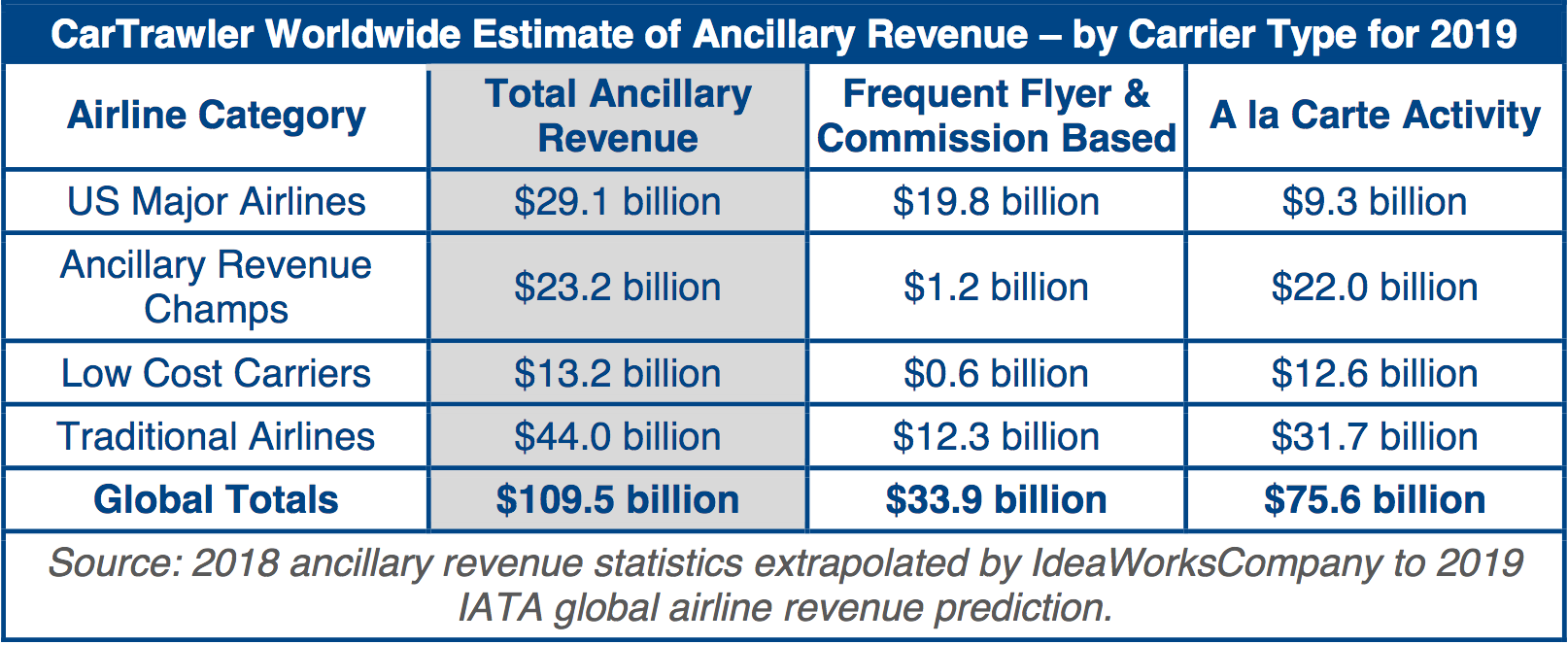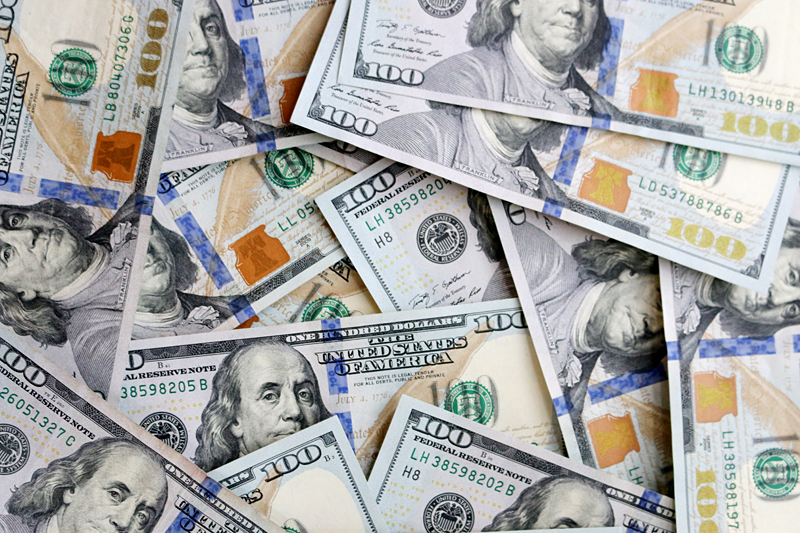Airlines worldwide are projected to collectively set another record in terms of the revenue they earn from fees charged for ancillary services and products, which is projected to be as high as $109.5 billion for the year 2019 and greater than quintuple the revenue of $22.6 billion in 2010 — as well as almost double the revenue from ancillary fees from only four years ago.
Airlines to Pass $100 Billion Mark in Ancillary Revenue For 2019. Should There Be Legislation Against That?

Fees charged for ancillary services and products is expected to comprise of approximately 12.2 percent of the global revenue of airlines in 2019, which would increase from 10.7 percent in 2018 when airlines collected $92.9 billion from ancillary fees; and ancillary revenue also equals more than half of the annual fuel bill of the commercial aviation industry worldwide.

“These statistics were applied to a larger list of 160 airlines to provide a truly global projection of ancillary revenue activity by the world’s airlines for 2019”, according to this press release document from IdeaWorksCompany, which is in its tenth year of preparing projections of ancillary revenue activity in a joint partnership with CarTrawler. “The ‘percentage of revenue’ results associated with four defined categories have been applied to a worldwide compilation of operating revenue disclosed by 160 airlines.”
The following describes the four categories — along with the increases in the average percentage of revenue when comparing 2019 to 2018:
- Major Airlines in the United States — 15.2 percent from 14.2 percent; and these carriers include Alaska Airlines, American Airlines, Delta Air Lines, Southwest Airlines, and United Airlines
- Ancillary Revenue Champs — 36.1 percent from 33.9 percent; and these carriers include AirAsia Group, Jet2.com, Pegasus, Ryanair, Viva Aerobus, and Volaris, which generate the highest activity as a percentage of operating revenue
- Low Cost Carriers — unchanged at 12.4 percent; and these carriers include Jambojet, Pobeda, SpiceJet, Sun Country Airlines, and VietJet Air
- Traditional Airlines — 8.2 percent from 6.7 percent; and these carriers include Aeroflot, Aeromexico, China Eastern, and SAS Scandinavian

“Consumers will see a substantial increase in the value they derive from air transport in 2019”, according to this publication titled Economic Performance of the Airline Industry from the International Air Transport Association, which is more popularly known as IATA and is a trade association of airlines around the world. “The average return fare (before surcharges and tax) of $317 in 2019 is forecast to be 61% lower than in 1998, after adjusting for inflation. The number of new destinations is forecast to rise further this year, with frequencies up too; both boosting consumer benefits. We expect 1% of world GDP to be spent on air transport in 2019, totaling $899 billion.”
That $899 billion will be spent by almost 4.6 billion passengers.
“Ancillary revenue also has proven to be a stable revenue source, even as passenger yields (revenue per mile) have been dropping since 2012”, according to the aforementioned report from IdeaWorksCompany and CarTrawler. “Competitive pressure from new airlines, capacity additions by existing carriers, and economic troubles have not affected the continued upward trajectory of ancillary revenue’s growing contribution to airline income statements.”
What Exactly are Ancillary Fees?

Ancillary fees are derived from activities, products and services which yield cash flow for airlines in addition to revenue from the basic main purpose of airlines: to safely transport passengers from their origination airport to their destination airport. Ancillary fees can be either optional or mandatory.
Optional products and services which are charged extra beyond the price of the ticket itself include — but are not limited to — checking baggage, reserving a seat in advance of the flight, upgrades to a better seat, priority boarding, fuel surcharges, food and beverages. Some fees — such as fuel surcharges, for example — are mandatory, meaning that avoiding payment for those fees are virtually impossible to customers.
Airlines are not the only travel companies which charge ancillary fees for products and services. As one of many examples, lodging companies also charge fees beyond the price of the room with such options as upgrades to a better room, room service, and for cleaning services for clothing and garments. Some fees — such as resort fees, for example — are mandatory, meaning that avoiding payment for those fees are virtually impossible to customers.
When optimally implemented, ancillary fees benefit customers by giving them more choice for purchasing optional products and services which they want while not paying for anything they do not want — while simultaneously increasing profits for the companies which charge them. Everyone supposedly wins.
Risks in the Ancillary Revenue Stream — and Should It Be Regulated?

Deriving revenue from ancillary services and products is not without risk, as reduced demand, lower prices, and a decrease in revenue can adversely affect the results of that significant ancillary revenue stream, which could potentially be unpredictable if consumers perceive to having no choices or options — or if airlines become careless about the implementation of such services and products while simultaneously being indifferent to offering real value…
…and then, there is always the threat of government regulation.
Consider a piece of legislation known as the Forbidding Airlines from Imposing Ridiculous — or FAIR — Fees Act, which was introduced on Wednesday, November 20, 2019 by two members of Congress and one member of the Senate in the United States who are all members of the Democratic political party. If it became law, this bill would prohibit airlines from charging fees — including cancellation, change, and baggage fees — which are not reasonable and proportional to the costs of the services actually provided. The bill also directs the Department of Transportation of the United States to review any other fees charged by airlines.
“Too often, airlines blindside travelers with exorbitant charges at checkout caused by unexpected fees for basic aviation services”, according to this press release from Steve Cohen, who represents the Ninth District in Tennessee in the House of Representatives and is a senior member of the Aviation Subcommittee of the House Committee on Transportation and Infrastructure. “This price gouging has exponentially grown as a business practice over the last decade. The top ten airlines worldwide collected $35.2 billion in ancillary fees in 2018, up from just $1.2 billion in 2007. In the first two quarters of 2019, U.S. domestic airlines collected $2.8 billion and $1.4 billion in just baggage and reservation fees, respectively. With the busiest travel season of the year still ahead, both of these figures are on track to reach all-time highs by the end of 2019.”
Jesus “Chuy” Garcia and Edward J. Markey — who represent the Fourth District in Illinois as a member of Congress and Massachusetts as a member of the Senate respectively — have co-sponsored the bill with Steve Cohen.
However, not everyone agrees that this bill is as friendly to the consumer as the sponsors of it would like for you to believe.
“These members of Congress fail to understand that it may not cost much to make a change to a reservation (staff time, computers, electricity) but consumers are getting something of value – flexibility – and airlines are charging for that”, according to this article written by Gary Leff of View From the Wing. “The simple reason though that this proposal is non-serious is that these fees are encouraged by the tax code and this legislation does nothing about that. The 7.5% excise tax on domestic travel applies to base airfare but not add-on fees. Reform that fails to address this disparate treatment is grandstanding but not tackling the issue. We get high fees because of both price discrimination and taxes. The notion that we can just tell airlines to charge less and expect travel to be cheaper as a result is silly, and the idea that a problem created by legislation needs new legislation to simply ban the bad effects is poor policy making.”
The pervasive problem with ancillary fees is that they are charged for many of the products and services which used to be included in the price of a ticket not so many years ago; and airlines have arguably not lowered airfares once they were removed from being included as part of the price of the ticket. As one of numerous examples, some Basic Economy airfares not only do not cost less than what airfares which were more inclusive of products and services cost years ago; but finding Basic Economy airfares which more are not impossible to find.
Basic Economy airfares typically do not include such services as reserving a seat assignment in advance and the opportunity to upgrade to a better seat. Passengers who hold Basic Economy tickets are usually the last people to board an airplane; and they could even be charged to either board with belongings or check baggage. Refunds and changes in the itinerary on Basic Economy fares are prohibited.
Summary

Although the economic environment should be as friendly to the consumer as possible — after all, anyone who is engaged in business and provides a product or service which satisfies the wants and needs of a customer deserves to be paid — the term reasonable keeps this bill too vague from being helpful…
…plus, I rarely support government intervention in the marketplace, as I believe market forces should determine commerce in general. People are choosing to pay for optional products and services offered by airlines, which are leading to record revenues pertaining to ancillary fees. The question is: are they paying ancillary fees because they want to pay for optional products and services — or are they paying them simply because they are uninformed and under-educated?
I am all for charging extra for optional products and services — as long as the base airfare decreases proportionally in price once those products and services are no longer included in the price of the ticket itself; and as long as efforts by companies are exhaustive in ensuring that consumers are completely aware of the choices pertaining to ancillary fees…
…but what I am against is charging ancillary fees which are virtually impossible to avoid — such as charging for baggage on a long-haul transoceanic trip with which passengers must carry necessary luggage and other belongings. I can understand charging extra for luggage for shorter flights to destinations where a passenger does not need much baggage — or baggage at all — for a successful trip.
Moreover, I am vehemently against mandatory fees — such as fuel surcharges with airlines and resort fees with lodging companies. They are deceptive because they allow companies to advertise an artificially lower price. If they were optional, that would be different — but if they are mandatory, they should be included in the base price of the flight or room.
I have written extensively over the years pertaining to ancillary fees charged by airlines in the form of articles posted here at The Gate — including:
- $59.2 Billion in Ancillary Revenue Projected For Airlines in 2015
- Have Ancillary Fees Increased Entitlement Attitudes?
- Would You Wear Your Belongings to Avoid Baggage Fees and Mishandled Luggage?
- This Fee Would Have Been a New Form of Deception If It Were Implemented
- Your Chance to Get Your Share of Money From American Airlines Checked Baggage Settlement
- Free Extra Baggage Allowance With Qatar Airways Through April 2019
- Airlines Earned Almost $4.2 Billion in Baggage Fees — But…
- Why Eliminating Baggage Fees Will Not Reduce Long Lines
- Skycaps Accused of Stealing Cash Collected From Overweight Baggage Fees
- Baggage Fees to Increase by Spirit Airlines During the Holiday Season
- Ryanair Slashes Bag Fees for Most of Its Customers. Yes, THAT Ryanair.
- Outrageous Airline Fees
- Censorship on Avoiding Baggage Fees?
- Are Cruise Lines The Next Frontier for Lucrative Ancillary Fees?
All photographs ©2015, ©2016 and ©2018 by Brian Cohen.
